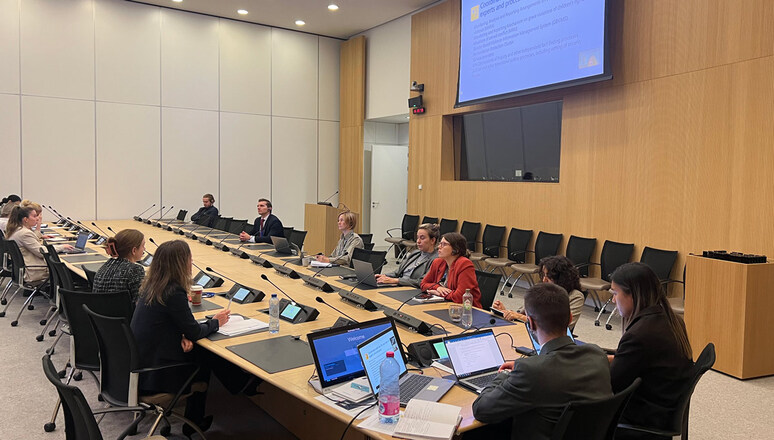On 19 June 2024, the International Day for the Elimination of Sexual Violence in Conflict, the NATO International Military Staff (IMS) Office of the Gender Advisor (GENAD) hosted its monthly Deep Dive session on Conflict-Related Sexual Violence (CRSV) and the Gender Perspective. It explored how CRSV requires a comprehensive and multi-faceted approach encompassing policy development, operational guidance and coordinated efforts across both military and civilian spaces.

Subject matter expertise was provided by Dr Lotte Vermeij, Senior Expert on UN Peace Operations and Conflict-Related Sexual Violence, Ms Charu Lata Hogg, Founder and Executive Director of the "All Survivors Project" and Ms Aysegul Binali, Humanitarian Affairs and GENAD at NATO Allied Land Command (LANDCOM).
Opening the session, Dr Vermeij discussed lessons learned from CRSV in UN Peace Operations. Dr Vermeij noted positive progress in the development of policies and guidelines for preventing and responding to CRSV. However, she underlined the importance of understanding how to provide physical protection to prevent violence and preserve resilience within communities in operational zones where the UN or NATO have a mandate to fulfil. Regarding the strategic level, she underscored the importance of interoperability with the operational level to better support military colleagues on the ground in monitoring and reporting CRSV. This is because they are "the eyes and ears on the ground" with better access to areas that civilians cannot reach. This also highlights the importance of strengthening pre-deployment trainings and education for the military on the Gender Perspective and CRSV, as they may be the first responders to cases of sexual violence in conflict. Dr Vermeij emphasised that effective prevention and response must account for the diverse needs of different genders and vulnerable populations, ensuring that all survivors receive appropriate support without re-traumatisation when engaged with. This also underscored how external conflict stakeholders' mandates must include capacity building efforts to support host countries in enhancing local ownership of the eradication of CRSV.
Next, Ms Hogg stated that CRSV intersects with gender, children and other intersectional issues. "All Survivors Project" highlights several critical gaps in addressing CRSV against men and boys, including in information, disclosure, capacity, monitoring and engagement. She stressed the importance of using an evidence-based approach to expand on existing available information in order to take concrete steps for men and boys. Furthermore, she explained that protection strategies must look at other relevant factors, such as the intersection of gender, age, sexual orientation and gender identity and how these compound other vulnerabilities in conflict settings. Based on her field work, she noted the targeting of men and boys in the ongoing aggression against Ukraine. Most of the documented cases occurred in detention situations where they double those recorded against women and girls. Among other practices used, "All Survivors Project" reported different forms of forced nudity, genital mutilation, electric shocks to genitals, rape and other sexual humiliations. Ms Hogg specified that it is currently hard to understand the long-term implications of this phenomenon on society. However, short term impacts include physical and psychological harm to individuals, families, sexual and reproductive rights, and the consequential breakdown of the social fabric, peace and security.
Closing the session, Ms Binali emphasised that CRSV is a war crime affecting women, men, girls and boys. She stated that preventing and responding to CRSV is a legal responsibility, a moral imperative and an intrinsic matter of international peace and security. Ms Binali explained that effective prevention and response to CRSV increases force capacity and capability through situational awareness, Concept of Operations (CONOPS), Military Operation Plan (OPLAN) and transition out-of-mission. Prevention and response strengthen the Force's mandate by having a positive impact not only on lasting peace and the rule of law, but also on the credibility and reputation of the Forces and their missions. Lastly, CRSV prevention and response affect mission outcomes such as security, legitimacy and operational effectiveness. Ms Binali underscored the importance of NATO's Military Guidelines in providing guidance for preventing and responding to CRSV by integrating these aspects into education, training, exercises, operations, planning, conduct of operations and evaluation of NATO-led operations and missions. She emphasised the importance of cross-cutting coordination with civil society in missions and operations to tackle CRSV, as these organizations are already present on the ground before NATO's mandate and after its termination.
NATO's role in protecting men and boys from CRSV can be strengthened by operationalizing CRSV policies through specific operational guidance and comprehensive training programs. Plus, coordination with UN entities and other stakeholders can improve information sharing and collaboration. Embedding gender-inclusive strategies within mission planning and exercises, pre-deployment training and in-mission support is essential. Medical Advisors can play a pivotal role in prevention and response by building trust within communities and ensuring access to essential health services, which are foundational for ethical and effective CRSV responses. Establishing and documenting best practices, particularly in gathering information without harming survivors, is crucial for continuity and effectiveness in future missions.






